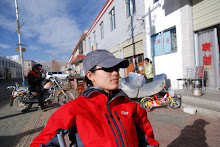
Today, I went to my best friend's finale party which celebrate the end of their 1 year trip around the U.S. to document the enivornmental stories in each state (check it out at YERT.com). The speaker held up a scale and asked where do we fall on it. Do we classify outselves on the white side or the very green side of the scale? Well, a majority of people raised their hands as medium green. I'd characterize this group of people who are doing things like buying local products, drying hybrids, recycling, and/or composting. This group of people doesn't just taking about being green, they practice it in their daily lives. They are the example of normal Americans who can live a very similar lifestyle compared to other people but with a slight twist that helps the environment.
I think people spend too much time fretting about how "difficult" it is to live a green lifestyle or compaining about how inconvenient it is. However, it really is not the case. Especially as products become tailored to this fast-growing group of Americans, it will make being green a lot easier. For example, Chico Bags is a brand of shopping bag that folds up into a tiny pouch so you can easily slip it into your purse and have it with you when your shopping. Buying organic products are a lot easier to find in everyday groceries stores and are better priced than in the past. There are also delivery services that bring locally grown produce straight to your door. One example is called Spud which has operations in Washington and Canda. Even my friend's family in Pittsburg has a local farm delivery fresh and organic groceries every week to their house! I mean talk about convenience!
I'm not saying run out this instant a go buy a hybrid or a compost bin. Rather, just be willing to take that first step into doing something green. There are a million of things normal Americans can be doing to help the enviornment but they are the ones that will have to do it. No one else can and the best part of all is that you'll realize "wow, that wasn't hard at all!"







